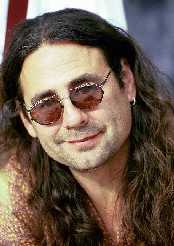

 |
 |
 |
Return to top
Ask San Francisco State University Biology Professor Neo Martinez about his teaching style, and you won't get a textbook answer.
"When I teach science, it's a dynamic process," says Martinez, a research scientist at the Romberg Tiburon Center for Environmental Studies (RTC). "It isn't nearly as regimented and organized as the textbook approach. Books teach science as this static body of knowledge that you memorize, but the excitement of science is the process-getting involved in it."
Martinez, whose father was the first Mexican-American in the United States to receive a doctorate in the physical sciences, pursues connections both in the classroom and in nature.
As an expert on food-web dynamics, his research focuses on finding new ways to reveal the intricate links, or connections, within ecosystems-from isolated mountain meadows to vast deserts. He takes this work-which has been published in such eminent science journals as Nature and Science-as seriously as he does his work with students. And he's particularly interested in encouraging minority students who might otherwise see careers in science as unattainable.
"Having a scientist of color standing before them in the classroom certainly makes a difference, but we have to be careful not to focus too much attention on 'superstar' role models, those whose accomplishments far exceed the average scientist," says Martinez, whose ethnicity is not the only challenge to common stereotypes of what a scientist should look like. His admittedly "laid-back" demeanor and casual appearance likewise defy stock images of stodgy men in white coats, but appeal to today's young ad ults.
"My worry is that some minority students will look at these star models and think, 'My god, I'll never measure up to that,'" Martinez says. "Students need to know you can succeed in science and enjoy it without giving up the rest of your life."
Martinez-who plays the steel-string guitar and takes every opportunity to ride his snowboard or mountain bike-sees himself as a "regular" guy who "didn't get good grades" but loved the scientific process. It's that passion for science, he says, that he tries to communicate to all his students. He does so in myriad ways.
In 1999 Martinez received a grant from the National Science Foundation (NSF)-matched by SFSU-to create an Instructional Environmental Science Computer Lab at the Tiburon Center. The lab offers new technology and curriculum to address issues in environmental science. Last spring, at the same time his paper on computer modeling of food web structures appeared in Nature, Martinez taught his Food Web Controversies course utilizing the new lab. Students also used the computer equipment to model their own foo d webs.
"The tools were right there in the lab," says Martinez, whose research has earned him a stream of NSF grants over the last two years. "They could run the model and see the output and go, 'Oh, so that's what we're talking about.' They were really psyched."
"Neo is doing some really stellar research in ecology," says RTC Director Alissa Arp. "What's more, he's able to incorporate this work-and his passion about it-into the classroom."
To bring students of color together in the sciences, Martinez also helped sponsor the University's first official chapter of the Society for the Advancement of Chicano and Native American Scientists, of which his father was a founding member.
Additionally, Martinez mentors underrepresented students every summer at the Rocky Mountain Biological Lab in Colorado. As part of NSF's Research Experiences for Undergraduates, students conduct fieldwork alongside visiting scientists. Martinez's last student, a young Native-American woman, was so taken by the experience that she applied to SFSU's graduate program in biology.
"I really want to encourage students to develop themselves, and to learn to be perceptive and critical thinkers about the world around them," says Martinez. "There are so many brilliant, creative people who are turned off from science early on because it's presented as this static body of facts. While quantitative rigor is important to teach, I also want to convey the allure of conducting science. Hopefully, I'll nurture some of those creative students."
-Merrik Bush-Pirkle
Return to December First Monday
Return to First Monday Archive
SFSU, 1600 Holloway Avenue, San Francisco, CA 94132
Last modified December 1, 1999, by Webmaster & Co.